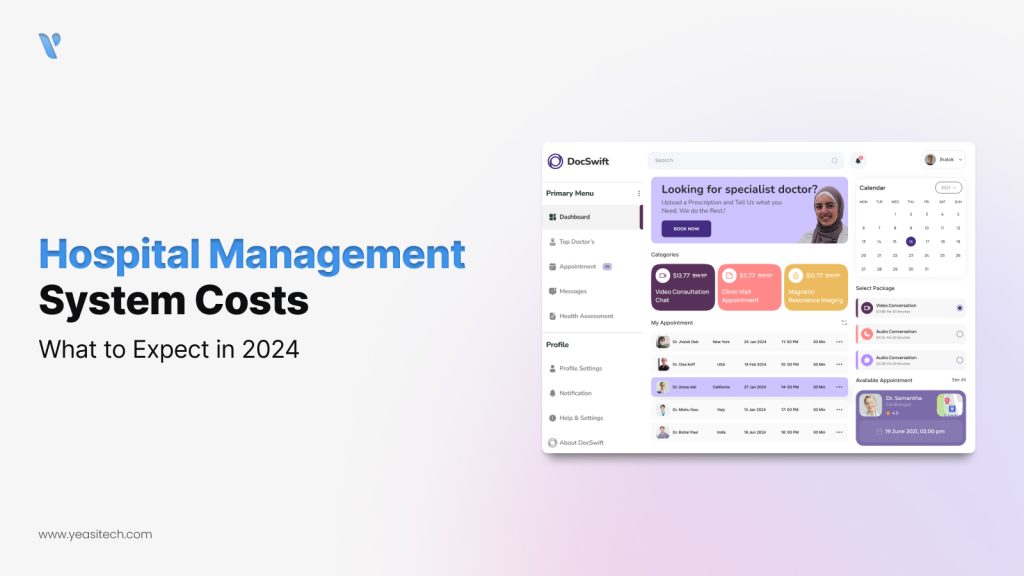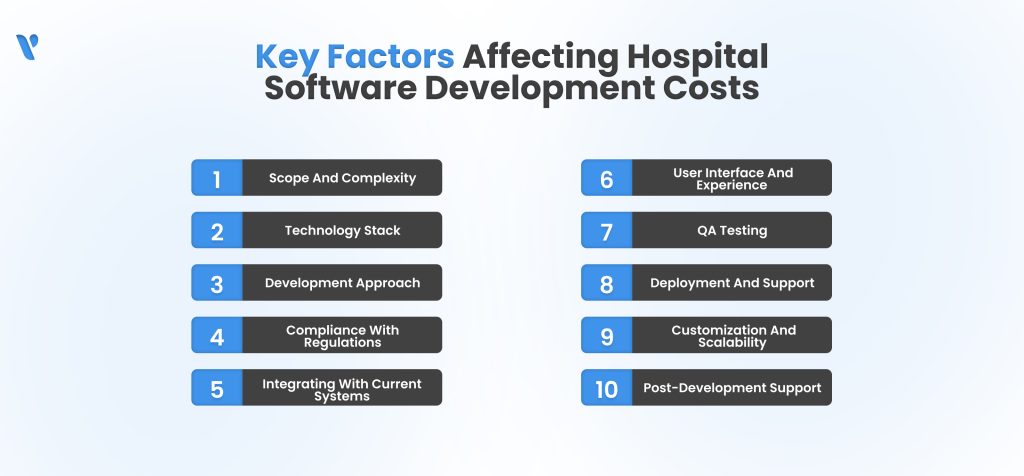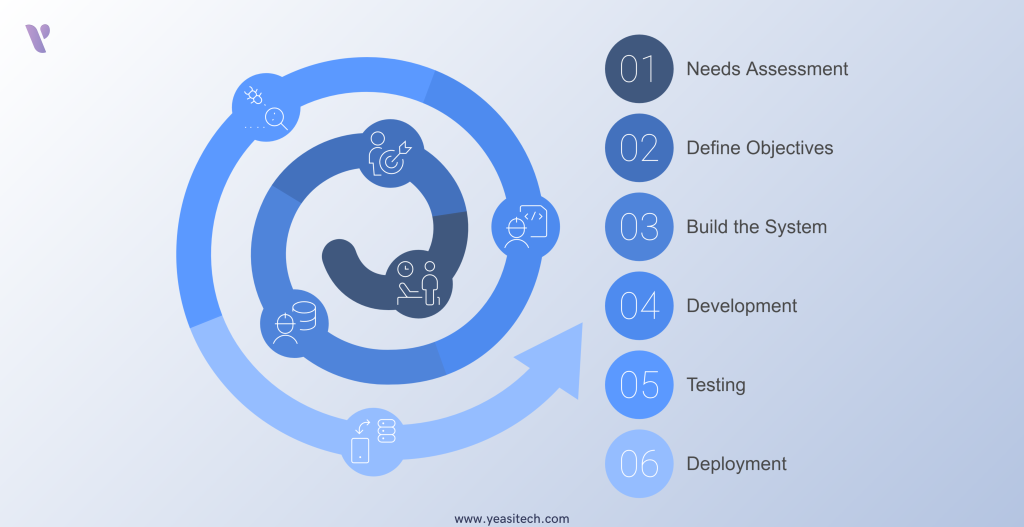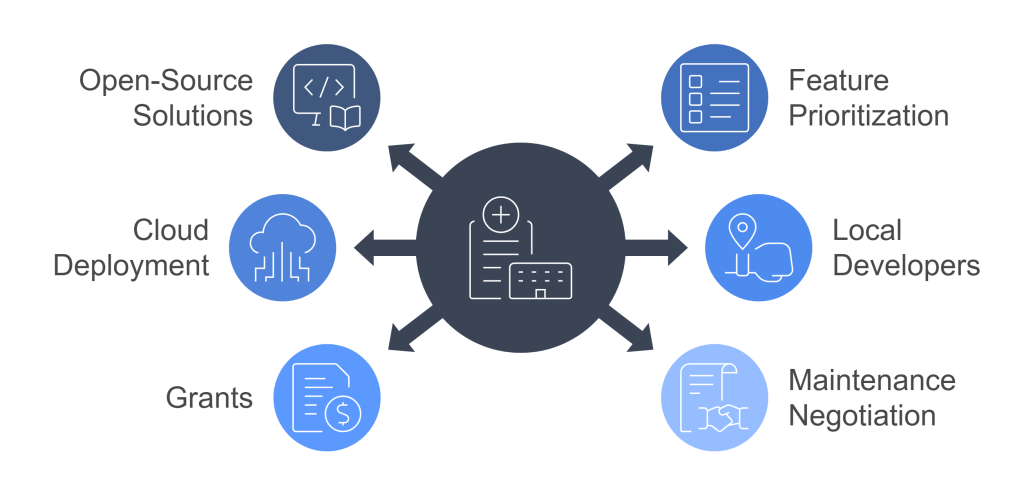How much does it cost to develop a Hospital Management System in 2025

Developing a Hospital Management System (HMS) involves various factors that affect the total cost. The scale and complexity of the project can significantly impact the cost. This article explores all aspects of HMS costs, providing an in-depth analysis of expenses, cost-saving strategies, and the average software cost. To find out more, continue reading.
According to Statista, the market for health management systems is anticipated to reach a value of over 50 billion dollars by 2025. Health organizations are spending more money on custom software development to promote patient satisfaction, improve workflow, and increase the effectiveness of care delivery. But how do you create hospital management software? What features should custom software include, and is it worth it? Let’s take a closer look at HMS, covering its features, design, development process, and cost.
Software that can be cloud-based or standalone is known as a hospital management system. It gathers and arranges all the information required to oversee hospital operations both within and outside the building. Information about physicians, patients, lab results, medical supplies, appointments, insurance, billing, and reports are all included in this. An HMS’s primary objectives are to reduce administrative expenses, decrease workload, minimize errors, boost productivity, and enhance patient satisfaction.
With an HMS, you can automate the majority of everyday chores, organize all data in one place, and manage every part of a healthcare facility’s workflow—all of which effectively eliminates the need for paper-based processes. The capacity of hospital management systems to be adaptable and modular while integrating with many platforms and technologies is one of their primary features.
The Hospital Management System (HMS) uses technology to simplify hospital operations and improve patient care. Patients, doctors, and administrators benefit from task simplification, including appointment scheduling, record management, and resource allocation. Below is a table of essential HMS features grouped by focus: patient, doctor, and admin.
| Patient-Focused Features | Doctor-Focused Features | Admin-Focused Features |
| Book Appointments Online: Easy scheduling for patients. | View Patient Records: Quick access to medical histories. | Organize Hospital Data: Keep all records in one place. |
| See Health Records: Patients can check test results and reports. | Manage Prescriptions: Easily create and share prescriptions. | Simplify Billing: Handle payments and invoices automatically. |
| Track Medications: Patients get reminders for medicines. | Check Test Results: Doctors can see reports instantly. | Schedule Staff: Plan staff shifts efficiently. |
| Use Mobile Apps: Access hospital services on a phone. | Set Reminders: Get alerts for patient care tasks. | Manage Supplies: Keep track of medicines and equipment. |
| Have Video Consultations: Talk to doctors from home. | Do Virtual Consultations: Provide care online through video calls. | Follow Rules: Make sure the hospital complies with regulations. |
| Get Health Tips: Tools to track health like blood pressure. | Support for Decisions: Tools to help make better diagnoses. | See Reports: Generate data on hospital and staff performance. |
| Receive Alerts: Notifications about appointments or medicine schedules. | Talk to Patients: Communicate directly with patients easily. | Handle Insurance: Manage claims and insurance processes. |
| Pay Securely Online: Make payments for services quickly. | Schedule Appointments: Organize daily patient visits. | Manage Facilities: Oversee rooms, equipment, and resources. |
| Support Many Languages: Help patients in their preferred language. | Access Tools for Tests: Use built-in diagnostic systems. | Control Access: Give staff the right level of access to data. |
| Share Feedback: Patients can review and rate their experiences. | Stay Organized: Tools to plan daily tasks and duties. | Keep Data Safe: Ensure privacy and security for sensitive information. |
Several factors influence the cost of developing hospital management software systems, especially with the increasing shift toward digital healthcare. Here are some important ones:

The cost of the hospital management software system is mostly determined by its features and size. HMS with complex features such as inventory control, patient administration, and invoicing would cost more than a basic Electronic Health Record (EHR) system.
Choosing the right technological stack, which consists of databases, frameworks, and programming languages, may have an effect on development costs. More modern and advanced tools may be more expensive at first, but they may provide better scalability and lower maintenance costs over time.
Whether you decide to hire a professional team, build software internally, or use a combination of the two will affect the final cost. While outsourcing to regions with cheaper labour costs may result in financial savings, there may be extra project difficulties.
Hospital management software needs to follow regulations and standards like HIPAA, ACHC, and GHA. Making sure it meets these requirements can be expensive during development.
Patients, doctors, and administrators benefit from task simplification, including appointment scheduling, record management, and resource allocation. Obsolete systems can increase development expenses because incorporating new software requires a lot of effort and time.
User interface (UI) and user experience (UX) design are critical components of software success. Superior UI/UX design increases satisfaction with the product but often increases development costs, particularly if extensive user testing and iteration are required.
Thorough testing and quality checks are essential for healthcare software. This can increase costs, as the software needs to be tested to fix any bugs and meet all requirements.
Other elements that raise the overall cost contribution include software implementation and maintaining the support system. Staff training, which includes technical support and software introduction, is a continuous expense.
If software has to be readily scalable or more configurable to allow for the inclusion of new features, costs for development may increase.
Hospital software systems require ongoing maintenance and support. The total cost increases when long-term upgrades, bug patches, and new feature development are budgeted for.
Want to read more about Healthcare Software? You can check our blogs below:
Different healthcare facilities have different hospital management systems. The system you choose will rely on your goals since it is made up of numerous modules, each with a unique function that can be customized to satisfy a particular requirement. There are a few primary varieties, though, that are often more prevalent.


The process of developing a hospital management system is intricate and has to be carefully planned and carried out. The following are the necessary steps to help you:
Let’s look into real-life success stories and how hospital management systems helped them grow one by one in depth:
Project Overview: To improve clinical workflows, expedite patient records, and increase decision-making throughout its multi-state network, the internationally renowned Mayo Clinic deployed a centralized HMS. The system combined scheduling, billing, telemedicine, and Electronic Health Records (EHR).
Development Cost: Estimated $1.5–$2 billion (including infrastructure upgrades and staff training)
Impact:
“Our HMS has revolutionized patient care, allowing us to deliver personalized and efficient treatment across our network.” – Dr. Gianrico Farrugia, CEO, Mayo Clinic
Project Overview: Mount Sinai Health System implemented a next-generation AI-powered HMS with blockchain-based patient record security, AI-assisted diagnostics, and automated insurance claim processing.
Development Cost: Estimated $500–$800 million.
Impact:
“Technology in HMS is not just about efficiency; it’s about ensuring every patient gets the right care at the right time.” – Dr. Kenneth L. Davis, CEO, Mount Sinai Health System
Project Overview: To improve patient care and simplify resource management, Cleveland Clinic implemented an AI-driven HMS with cloud-based EHR, predictive analytics, and automated appointment booking.
Development Cost: Estimated $1–$1.5 billion.
Impact:
With our HMS, we have been able to provide more efficient, data-driven, and patient-centered care.” – Dr. Tom Mihaljevic, CEO, Cleveland Clinic
You can also read YeasiTech’s Case Study on developing an AI-driven Digital Health Platform:

Let’s break down the costs associated with hospital management system software for healthcare facilities. The following figures are derived from the expertise of our software developers in developing similar apps and from industry norms in the field of IT.
| Stage | Details | Standard Costing |
| 1. Design | Implementation of UI/UX elements. | $500 |
| 2. Development | Writing and building the code and program. | $4000 – $8000 |
| 3. Testing and QA | Preventing bugs and ensuring functionality. | Free Service |
| 4. Deployment and Integration | Implementing and setting up with corresponding systems. | $600 – $1000 |
| 5. Maintenance and Updates | Continuous maintenance and regular updates. | $500 – $1000 |
| 6. Training and Support | Providing staff training and ongoing support. | Free |
| 7. Miscellaneous Cost | Equipment, management, and other expenses. | $500 |
Please get in touch with our team if you would like a customized software estimate. Our team will assess your needs as a business and as a product before presenting an elaborate cost estimate.

More hospitals are shifting their operations to digital systems. A hospital database management system helps streamline a healthcare organization’s workflow and data management. Whether you’re looking for a pre-built solution or planning to create a custom online clinic management system, YeasiTech can help. Reach out to make your vision a reality
Contact us today to discuss your requirements and take the first step toward transforming your hospital’s operations!
The cost can range from $5,000 to $10,000 or more, depending on factors like system complexity, features, platform (web or mobile), and geographical location of the development team.
Key factors include the scope of features (e.g., patient management, billing, telemedicine), customization, scalability, technology stack, integration with existing systems, and compliance with healthcare regulations like HIPAA or GDPR.
Development timelines range from 6 months to over 18 months, depending on the project’s complexity, the size of the development team, and the inclusion of advanced features like AI or machine learning.
Yes, pre-built solutions or SaaS platforms can significantly lower initial costs, typically starting at $1,000 to $10,000 per year, but they may have limitations in customization and scalability compared to custom-built systems.
YeasiTech is a trusted IT service partner with 8+ years of experience, empowering 250+ businesses with scalable web, mobile and AI solutions.
Explore related topics to broaden your understanding and gain actionable insights that can transform your strategies.